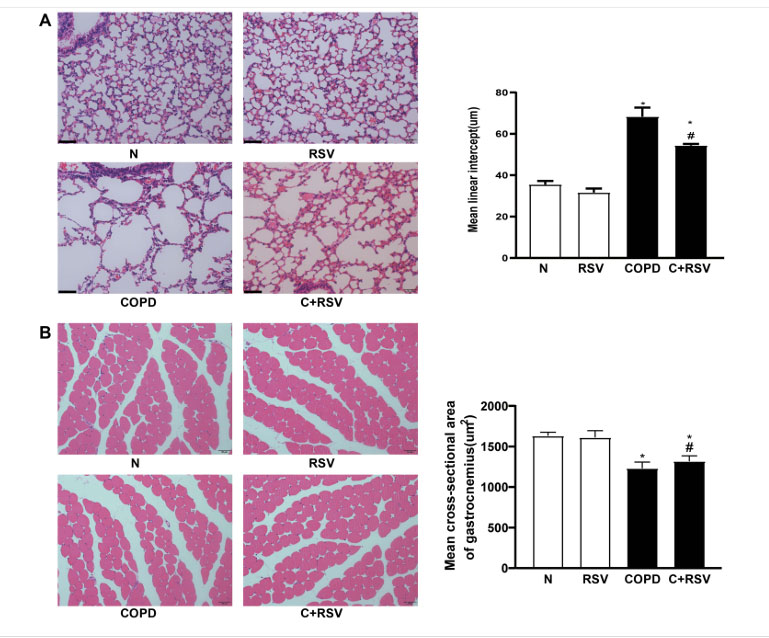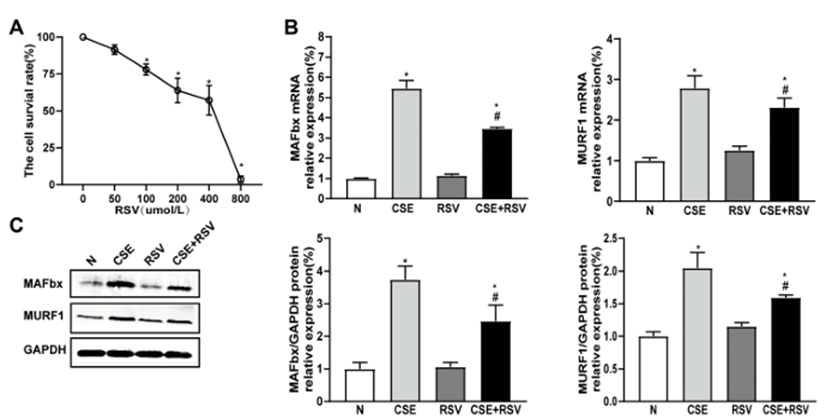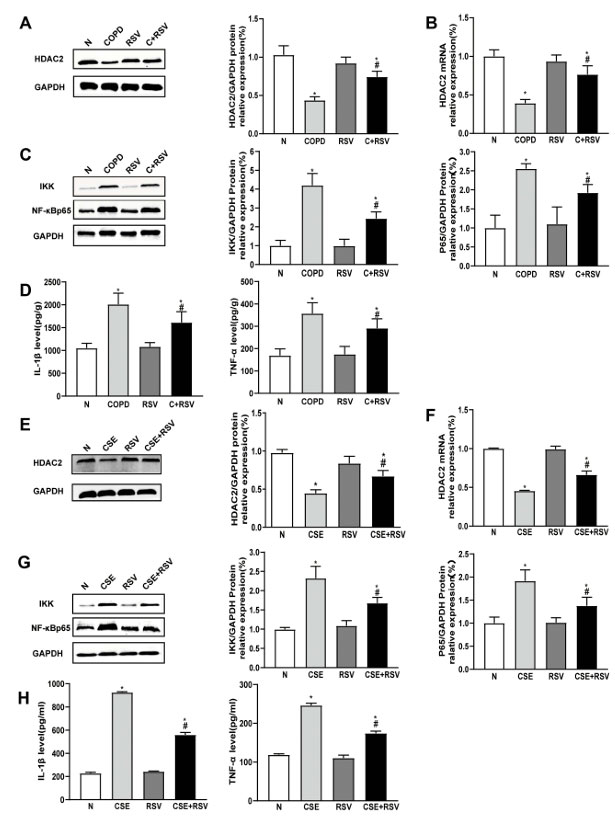Resveratrol (RSV) is a natural polyphenolic compound with antioxidant, anti-inflammatory, and anti-senescence and antitumor effects. A new study investigated the effects of resveratrol (RSV) on cigarette smoke (CS)-induced skeletal muscle atrophy and cellular senescence in mice.
Thirty-two male mice were randomly divided into four groups: the control group (N), the resveratrol group (RSV), the emphysema group (COPD) and the treatment group (C+RSV).
The N and RSV groups (n=8) were exposed to room air for 24 weeks, and the COPD and C+RSV groups were exposed to cigarette smoke for 24 weeks. The RSV and C+RSV groups were treated with RSV (200 mg/kg, Sigma–Aldrich, USA) by gavage daily from week 25 through week 28, while the N and COPD groups were treated with an equivalent volume of saline from week 25 through week 28.
Resveratrol Ameliorates Emphysema and Skeletal Muscle Atrophy
The study showed that the condition of mice with induced emphysema were improved with regular resveratrol treatments. Resveratrol was also shown to improve skeletal muscle atrophy in mice.
These data suggest that RSV reverses the development of chronic CS-induced emphysema and skeletal muscle atrophy. (1)

Resveratrol Decreases Atrophy and Senescence-Related Protein Expression
Treatment with resveratrol decreased proteins that were related to muscle atrophy and cellular senescence, suggesting that resveratrol has both anti-atrophy and anti-senescence properties.
Compared to the control group, the expression of atrophy-related proteins (MURF1, MAFbx) and senescence-related proteins (P53, P21) was significantly increased (1)
These results suggest that RSV has anti-atrophy and anti-senescence effects in the gastrocnemius muscle of CS-exposed mice. (1)
Resveratrol Inhibits Myotubular Atrophy
Resveratrol reversed signs of CSE-induced myotube atrophy. Treatment with resveratrol was shown to inhibit atrophy in C2C12 cells.
the CSE-induced myotube diameter of C2C12 cells was significantly smaller than that of the control group, while the CSE-induced myotube diameter decrease was reversed by RSV treatment (1)
Resveratrol Ameliorates CSE-Induced Senescence
Resveratrol inhibited factors related to cellular senescence after incubation with CSE. Resveratrol not only reduced the number of senescent cells in the CSE group but reduced the increase in CSE-induced senescence in C2C12 cells.
RSV inhibited P53 and P21 expression levels after incubation with CSE. In contrast, RSV treatment increased the protein expression of SMP30 in CSE-treated C2C12 cells (1)
Furthermore, we found that the number of senescent cells in the CSE group was significantly increased compared to that in the control group (1)
Treatment with RSV reduced the increase in CSE-induced senescence in C2C12 cells (1)

Resveratrol Increases HDAC2 Expression and Reduces Inflammation
The study shows that inflammation was a response to CS-induced skeletal muscle atrophy and cellular senescence.
It has been demonstrated that CS-induced skeletal muscle atrophy and senescence are associated with the HDAC2-mediated inflammatory response (1)

Conclusion: Resveratrol improves skeletal muscle atrophy and senescence
Resveratrol was shown to suppress inflammation levels, which improved skeletal muscle atrophy and signs of cellular senescence.
These results indicated that RSV ameliorates CS-induced skeletal muscle atrophy and senescence by upregulating HDAC2 and suppressing inflammation (1)
In conclusion, RSV prevented CS-induced skeletal muscle atrophy and senescence in mice with emphysema. (1)
References
